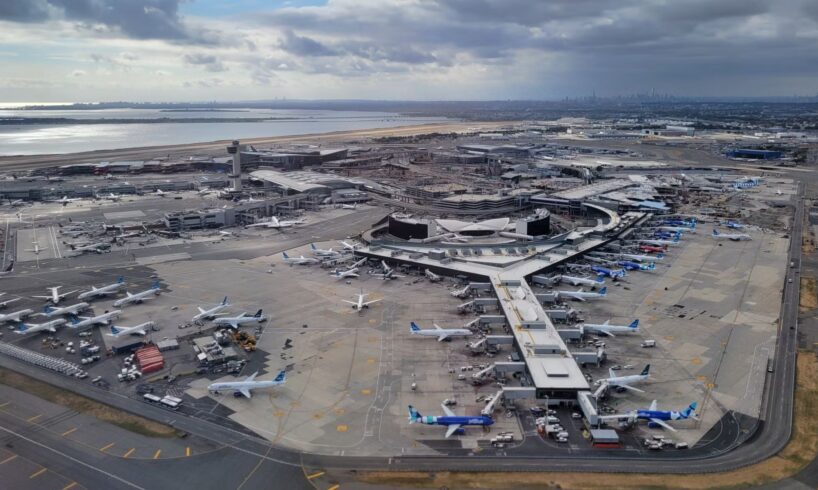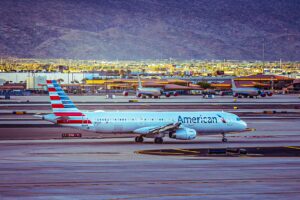
The US Department of Transport ( DOT) has issued a stark warning today that if the current federal government shutdown continues into next week, it may be forced to shut down parts of US airspace. As reported by ABC News, Transportation Secretary Sean Duffy stated that the country’s airspace system is under immense strain, warning that this could result in mass chaos.
At 35 days, the current shutdown is tied as the longest in the history of the United States. Lawmakers in Congress have been unable to pass legislation on the funding of the federal government. Duffy’s comments come as another vote in the Senate failed earlier today, marking the 14th time that the legislation failed to reach the required 60-vote threshold.
The Staffing Crisis In ATC Towers
Credit: Shutterstock
As part of the shutdown, federal workers are not receiving pay, but essential workers are still required to show up despite not receiving their paychecks, and that includes air traffic controllers. It’s estimated that there are roughly 13,000 air traffic controllers working without pay. Already, facilities across the country have been wrestling with a general shortage of air traffic controllers, and this shutdown is exacerbating the problem.
The number of sick calls and absences in ATC towers has increased drastically since the start of the shutdown. Initially, the impact was minor, but the staffing shortage has worsened and worsened as the current shutdown is poised to become the longest in US history. The FAA is now reporting that nearly 50% of the country’s major ATC facilities are short on staff.
Previously, Duffy stated that air traffic controllers who did not show up to work could be fired despite the circumstances, but he’s now taken a softer approach in recent days, clarifying that controllers will not be fired. When speaking at an unrelated event on Monday, November 3, he stated,
“These hard-working Americans have bills to pay, and they are being forced to make decisions and choices… Do they go to work as an air traffic controller, or do they have to find a different job to get resources, money, to put food on their table, to put gas in their car? And as every day goes by, I think the problem is only going to get worse, not better.”
The Potential Impact Of The Government Shutdown
Credit: Shutterstock
Just two days ago, on Sunday, November 2, Newark Liberty International Airport was hit with multiple ground stops due to a shortage of air traffic controllers. Overall, over 120 flights were cancelled, and the average delay was roughly two hours, with some flights being delayed by over three hours. In early October, Hollywood Burbank Airport had zero air traffic controllers in the tower for nearly six hours.
Duffy warns that the continued shutdown of the federal government could lead to, as he describes, “mass chaos”. Specifically, the continued shortage of air traffic controllers could lead to parts of the US’s airspace being fully closed. He emphasizes that the airspace system remains safe, but that there is an elevated risk. Additionally, mass flight delays and cancellations are likely.
But it’s not just air traffic controllers that are affected by the government shutdown. TSA agents are also considered essential workers by the federal government, and have also been going to work without pay. An increased number of call-outs and absences has led to an increase in wait times and lines, with passengers at Houston George Bush Intercontinental Airport reporting wait times of over three hours on Monday, November 3.
The Future Outlook On The US Airspace System
Credit: Shutterstock
Airline stock is falling as the government shutdown continues on. With no immediate prospects of a bill passing, controllers are at risk of missing a second paycheck, and they’re not the only workers impacted, either. The shortage of TSA agents is resulting in long wait times at certain airports, and this will likely spread to other airfields as well.
What’s worth mentioning is that there already exists a general shortage of air traffic controllers in the US. Six-day workweeks and mandatory overtime are common at the US’s largest airports, and controllers also have to battle high flight volumes and outdated equipment. It’s a fragile system at best, and when an event like a government shutdown occurs, the system collapses.
It’s unclear when the shutdown will end, as progress in the Senate remains stalled. In the immediate future, passengers should expect that TSA lines will be far longer than normal, and delays or cancellations are likely. Until the shutdown ends, there’s also no immediate prospect of the situation improving.






